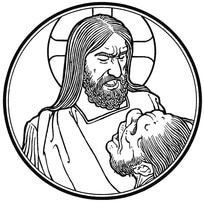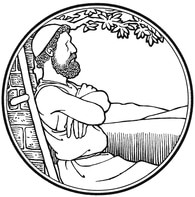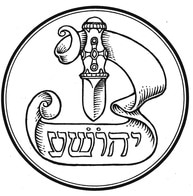 Why follow him? Jesus shows his glory by his triumph over the devil. In his own day he sometimes did that openly for many to see. He still does it just as effectively but in a less public, less obvious way. Just as his victory made manifest his glory then, so it does now. Just as then, so now, everything is accomplished through his Word.
0 Comments
 Jesus shows his glory in the kind of people that he calls to serve him and in using the gospel to make them willing to follow him. This Sunday it is the epistle lesson that gives unity to the readings, since all of the other readings deal with specific calls to a full time following that leaves behind secular vocations. Jesus still calls such to the holy ministry. To all however comes the call to follow him with a willingness to abandon everything should faithfulness require it; the calls in these readings bid us have a mindset that has forsaken everything, even when we are not required to do it.
 It is in the Word that we hear the call of God that has in it the secret power of God to give what he commands. He commands: Believe! and the Word creates faith. He says, Follow me! and the Word creates the desire and the ability to follow him. That he should consider it glorious to call sinners, is that not an amazing thing? That he should attach such power to his Word that we answer the call, is that not a wonder that lasts an eternity for each of us?
Divine Service ~ January 8, 2016 ~ The First Sunday after Epiphany – The Baptism of Jesus (Observed)1/8/2017  The long-expected Christ has arrived; the waiting is over as the Son of David is anointed. The Father’s approval sounds from heaven and book-ends the season of Epiphany, when, with the Holy Spirit and with power, it thunders again on the Mount of Transfiguration as the Son is revealed in glory.
 On January 6, the Church celebrates the Feast of the Epiphany of our Lord. This feast commemorates no event but presents an idea that assumes concrete form only through the facts our Lord's life. The idea of Epiphany is that the Christ who was born in Bethlehem is recognized by the world as God. At Christmas, God appears as man, and at Epiphany, this man appears before the world as God. That Christ became man needed no proof. But that this man, this helpless child, is God needed proof. The manifestations of the Trinity, the signs and wonders performed by this man, and all his miracles have the purpose of proving to men that Jesus is God. Lately, especially in the Western Church, the story of the Magi has been associated with this feast day. As Gentiles who were brought to faith in Jesus Christ, the Magi represent all believers from the Gentile world.
 Already on the eighth day of Jesus’ life, his destiny of atonement is revealed in his name and in his circumcision. At that moment, his blood is first shed and Jesus receives the name given to him by the angel: “You shall call his name Jesus, for he will save his people from their sins” (Matthew 1:21). In the circumcision of Jesus, all people are circumcised once and for all, because he represents all humanity. In the Old Testament, for the believers who looked to God’s promise to be fulfilled in the Messiah, the benefits of circumcision included the forgiveness of sins, justification, and incorporation into the people of God. In the New Testament, St. Paul speaks of its counterpart, Holy Baptism, as a “circumcision made without hands” and as “the circumcision of Christ” (Colossians 2:11).
|
Archives
February 2019
Categories
All
|
||||||||||||||||||||||||||||||||||||

 RSS Feed
RSS Feed
